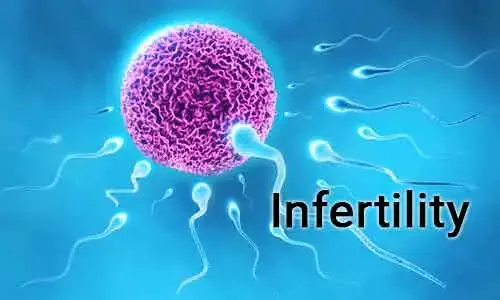- Home
- Medical news & Guidelines
- Anesthesiology
- Cardiology and CTVS
- Critical Care
- Dentistry
- Dermatology
- Diabetes and Endocrinology
- ENT
- Gastroenterology
- Medicine
- Nephrology
- Neurology
- Obstretics-Gynaecology
- Oncology
- Ophthalmology
- Orthopaedics
- Pediatrics-Neonatology
- Psychiatry
- Pulmonology
- Radiology
- Surgery
- Urology
- Laboratory Medicine
- Diet
- Nursing
- Paramedical
- Physiotherapy
- Health news
- Fact Check
- Bone Health Fact Check
- Brain Health Fact Check
- Cancer Related Fact Check
- Child Care Fact Check
- Dental and oral health fact check
- Diabetes and metabolic health fact check
- Diet and Nutrition Fact Check
- Eye and ENT Care Fact Check
- Fitness fact check
- Gut health fact check
- Heart health fact check
- Kidney health fact check
- Medical education fact check
- Men's health fact check
- Respiratory fact check
- Skin and hair care fact check
- Vaccine and Immunization fact check
- Women's health fact check
- AYUSH
- State News
- Andaman and Nicobar Islands
- Andhra Pradesh
- Arunachal Pradesh
- Assam
- Bihar
- Chandigarh
- Chattisgarh
- Dadra and Nagar Haveli
- Daman and Diu
- Delhi
- Goa
- Gujarat
- Haryana
- Himachal Pradesh
- Jammu & Kashmir
- Jharkhand
- Karnataka
- Kerala
- Ladakh
- Lakshadweep
- Madhya Pradesh
- Maharashtra
- Manipur
- Meghalaya
- Mizoram
- Nagaland
- Odisha
- Puducherry
- Punjab
- Rajasthan
- Sikkim
- Tamil Nadu
- Telangana
- Tripura
- Uttar Pradesh
- Uttrakhand
- West Bengal
- Medical Education
- Industry
Low BMI associated with poor outcomes of intrauterine insemination

Reproductive outcomes have been shown to be linked to maternal weight in a wide variety of studies. Underweight and overweight may affect reproduction and interfere with treatment of infertility. In the present retrospective analysis, Zheng, J., Cai, J., Liu, L. et al. sought to evaluate the effect of low body mass index (BMI) on pregnancy and perinatal outcomes in frozen–thawed embryo transfer (FET) cycles.
There is, however, very little data with respect to how being underweight (body mass index [BMI] < 18.5 kg/m2) influences these same outcomes. Studies that have been published provide inconsistent findings, potentially as a consequence of variability in methodology, inclusion criteria, BMI definitions, outcomes assessed, or adjustments based on confounding variable
To evaluate the association between body mass index (BMI) and pregnancy outcomes in women receiving intrauterine insemination (IUI) treatment, the study included 6407 women undergoing 13,745 IUI cycles stratified by BMI. Cox regression was used to analyze the association between BMI and cumulative live births across multiple IUI cycles. A generalized estimating equation (GEE) was used to analyze the live birth rate per cycle.
Compared with normal-weight women (n = 4563), underweight women (n = 990) had a lower cumulative pregnancy and live birth rate (20.71% vs 25.93% and17.17% vs 21.61%, respectively), while overweight women (n = 854) had a higher cumulative pregnancy and live birth rate (31.97%, 26.58%). Adjusted for confounders, the hazard ratio (HR) for achieving live birth following up to a maximum of four IUI cycles was 0.80 (95% CI: 0.67–0.95), comparing underweight with normal weight. In the GEE analyses, low BMI was also associated with a lower per-cycle birth rate (OR 0.79, 95% CI: 0.66–0.95), with adjustment for cycle-specific parameters, including ovarian stimulation, endometrial thickness, and follicular diameter.
The authors concluded Low BMI is associated with poor IUI outcomes.
SOURCE: Zheng, J., Cai, J., Liu, L. et al. Low BMI is associated with poor IUI outcomes: a retrospective study in 13,745 cycles. J Assist Reprod Genet (2022). https://doi.org/10.1007/s10815-022-02658-y
MBBS, MD Obstetrics and Gynecology
Dr Nirali Kapoor has completed her MBBS from GMC Jamnagar and MD Obstetrics and Gynecology from AIIMS Rishikesh. She underwent training in trauma/emergency medicine non academic residency in AIIMS Delhi for an year after her MBBS. Post her MD, she has joined in a Multispeciality hospital in Amritsar. She is actively involved in cases concerning fetal medicine, infertility and minimal invasive procedures as well as research activities involved around the fields of interest.
Dr Kamal Kant Kohli-MBBS, DTCD- a chest specialist with more than 30 years of practice and a flair for writing clinical articles, Dr Kamal Kant Kohli joined Medical Dialogues as a Chief Editor of Medical News. Besides writing articles, as an editor, he proofreads and verifies all the medical content published on Medical Dialogues including those coming from journals, studies,medical conferences,guidelines etc. Email: drkohli@medicaldialogues.in. Contact no. 011-43720751


